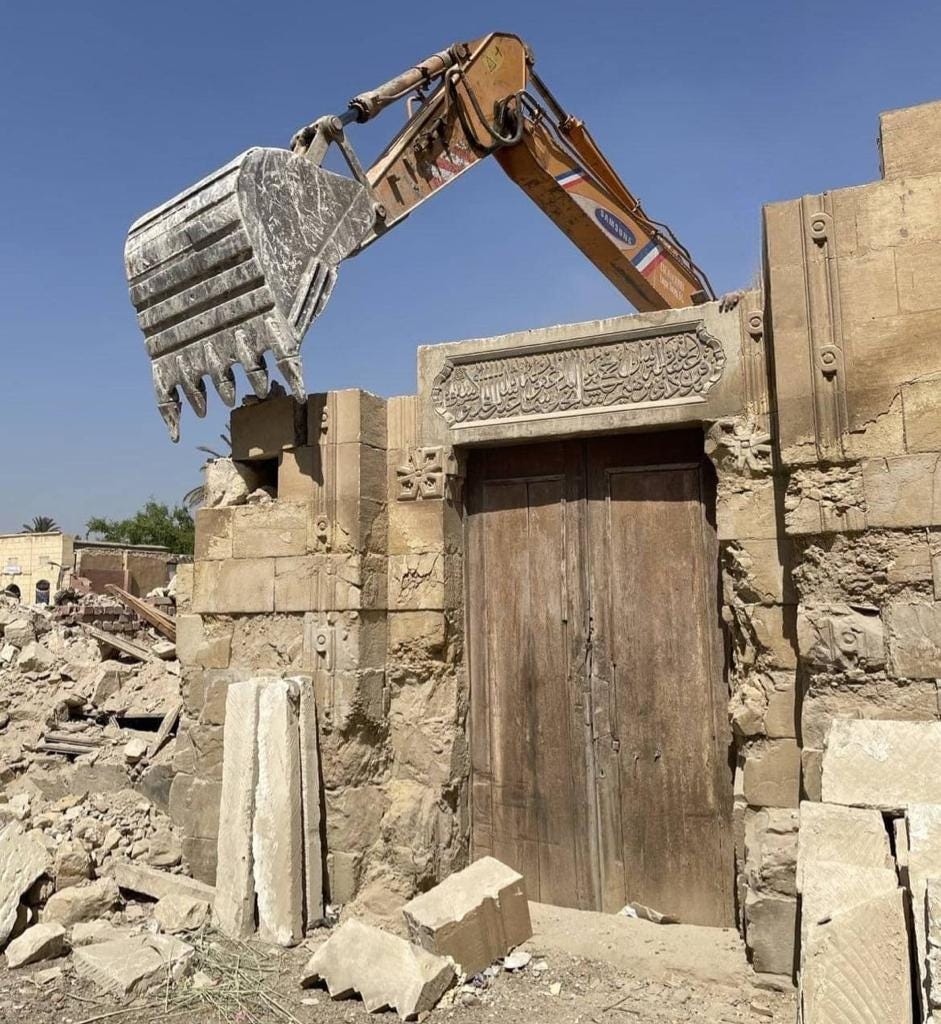This dispatch includes information on the militarization of urban planning, Sinai, child soldiers, military economy, conscription, US military aid, ideological indoctrination of lawyers and preachers, arms imports, surveillance and deaths in police custody.
📁 Why Sisi Is Turning Egypt Into a Large Military Camp
Dissent in Egypt has long been quashed by President Abdel Fattah el-Sisi, who did not hesitate to unleash a bloodbath after his 2013 military coup, conduct mass arrests, and build mega prison complexes.
Spontaneous protests erupt occasionally but they are swiftly brought under control. Under such austere repressive conditions, much of the dissent has been channelled online, though the security services regularly target internet users and censor hundreds of websites.
Recently, social media platforms have been stoked with anger, triggered by the drive to demolish historical monuments in Cairo and cull trees in the urban centers.
At the time of writing, bulldozers are destroying historical cemeteries, which are part of the capital’s Islamic heritage, in order to build bridges and freeways. Architects have charged that such levels of destruction and disregard for cultural heritage have gone beyond what any foreign occupation forces or natural disasters have caused in Egypt’s history.
The country’s civil society remains crippled by the post-2013 crackdowns, which saw Sisi dismantling any entity capable of operating independently from the state. But archaeologists, architects, and activists have taken to social media, trying to make noise about the ongoing demolitions and documenting the mausoleums under the threat of removal. And some have launched an online petition to try to pressure the regime to halt its bulldozers.
Simultaneously, in recent years, the state has embarked on a campaign to cull trees and eradicate green spaces in the urban centers, and not only during road expansion work.
The campaign is systemic at a time when the regime has hosted Cop27, while repeatedly publicizing its commitment to “green transformation” and fighting climate change.
Government officials’ statements fluctuate between denying the war on greenery and occasionally giving unsober justifications.
Several Facebook groups and pages have sprung up to lobby the authorities to stop the culling. On occasion, spontaneous initiatives by concerned residents, organized through messaging apps, have managed to save their neighborhoods’ green spaces.
A ‘perfect’ military camp
French philosopher Michel Foucault argued that the rise of the modern capitalist state was organically intertwined with the development of mechanisms for social control. State authorities also built disciplinary institutions and perfected the art of surveillance to ensure the docility of the population.
In order to achieve such control and comprehensive surveillance, the state adopted the model of the “military camp” in its urban structures and institutions.
“In the perfect camp, all power would be exercised solely through exact observation; each gaze would form a part of the overall functioning of power,” he wrote.
“The perfect disciplinary apparatus would make it possible for a single gaze to see everything constantly.” Therefore, it is this model of a surveilled military camp that guides capitalist urban planning, organizing, and even architecture, be it “working-class housing estates, hospitals, asylums, prisons, schools.”
The drive towards turning society into a military camp would accelerate during times “when there was a fear that popular resistance movements, inertia, or rebellion might upset the entire capitalist order...every individual had to be under precise and concrete surveillance,” Foucault further asserted.
Militarization of urban planning
One cannot fathom the eradication of greenery and the obsession with freeways and bridges, even at the expense of cultural treasures, apart from the regime’s drive to militarize all aspects of governance and life in Egypt after the 2013 coup.
The urban landscape has seen a fast transformation. The state has become more brazen in removing entire urban poor neighborhoods, which Mubarak had long sought to gentrify but could not due to local resistance. Sisi employs brute force to go beyond Mubarak’s failed ambitions.
Another catalyst for such measures echoes historical parallels with post-1848 Paris, which was demolished and rebuilt after the popular insurrections were put down to facilitate swift troop deployment and control of public spaces.
Four Egyptian urban planners, whom I interviewed, were quick to mention security access as one of the key factors behind the wide-scale demolitions and bridge construction, most notably in Cairo, Giza, and Alexandria.
The eradication of greenery and erection of bridges are thus an essential component of securitizing public spaces, in the quest for military domination.
” Bridges fragment communities,” prominent Egyptian historian Khaled Fahmy told me. “The bridges and highroads that they are building atomise society, which is us, the enemy and source of worry. They also serve to eliminate public space. Where do Egyptians gather and meet? The squares and streets. These are being taken away to deprive us of social unity,” he added.
During the 2011 revolution, millions prophetically chanted: “Yasqut yasqut hukm al-'askar! Masr dawla mish mu’askar!” which translates to: “Down with military rule! Egypt is a state, not a [military] camp!”
Today, Sisi’s counterrevolutionary regime is turning the country into one large military camp.
This opinion piece first appeared on the Middle East Eye website.




